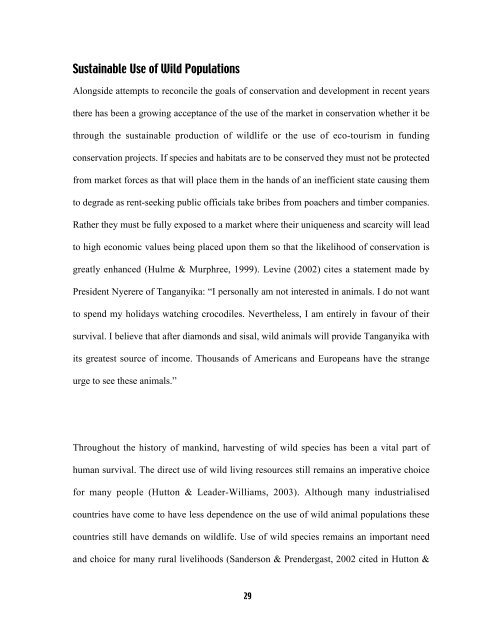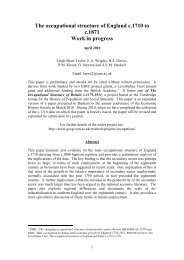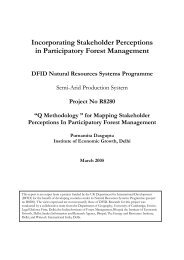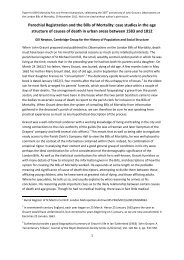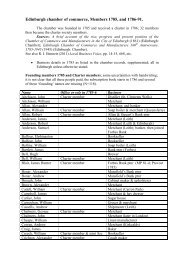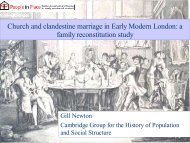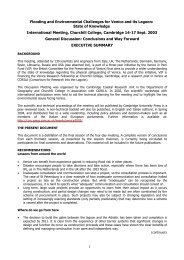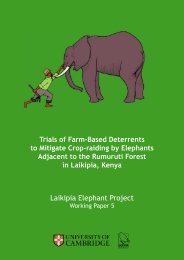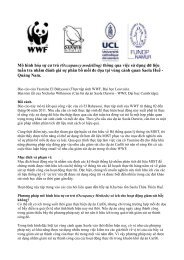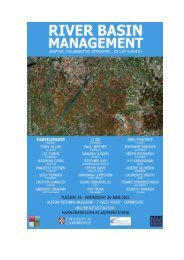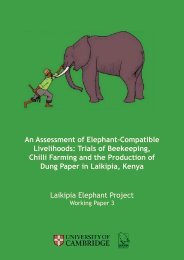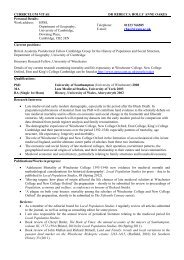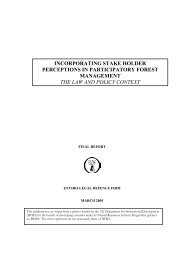Rob Small's Masters Thesis: Uptake and the success of insect ...
Rob Small's Masters Thesis: Uptake and the success of insect ...
Rob Small's Masters Thesis: Uptake and the success of insect ...
You also want an ePaper? Increase the reach of your titles
YUMPU automatically turns print PDFs into web optimized ePapers that Google loves.
Sustainable Use <strong>of</strong> Wild Populations<br />
Alongside attempts to reconcile <strong>the</strong> goals <strong>of</strong> conservation <strong>and</strong> development in recent years<br />
<strong>the</strong>re has been a growing acceptance <strong>of</strong> <strong>the</strong> use <strong>of</strong> <strong>the</strong> market in conservation whe<strong>the</strong>r it be<br />
through <strong>the</strong> sustainable production <strong>of</strong> wildlife or <strong>the</strong> use <strong>of</strong> eco-tourism in funding<br />
conservation projects. If species <strong>and</strong> habitats are to be conserved <strong>the</strong>y must not be protected<br />
from market forces as that will place <strong>the</strong>m in <strong>the</strong> h<strong>and</strong>s <strong>of</strong> an inefficient state causing <strong>the</strong>m<br />
to degrade as rent-seeking public <strong>of</strong>ficials take bribes from poachers <strong>and</strong> timber companies.<br />
Ra<strong>the</strong>r <strong>the</strong>y must be fully exposed to a market where <strong>the</strong>ir uniqueness <strong>and</strong> scarcity will lead<br />
to high economic values being placed upon <strong>the</strong>m so that <strong>the</strong> likelihood <strong>of</strong> conservation is<br />
greatly enhanced (Hulme & Murphree, 1999). Levine (2002) cites a statement made by<br />
President Nyerere <strong>of</strong> Tanganyika: “I personally am not interested in animals. I do not want<br />
to spend my holidays watching crocodiles. Never<strong>the</strong>less, I am entirely in favour <strong>of</strong> <strong>the</strong>ir<br />
survival. I believe that after diamonds <strong>and</strong> sisal, wild animals will provide Tanganyika with<br />
its greatest source <strong>of</strong> income. Thous<strong>and</strong>s <strong>of</strong> Americans <strong>and</strong> Europeans have <strong>the</strong> strange<br />
urge to see <strong>the</strong>se animals.”<br />
Throughout <strong>the</strong> history <strong>of</strong> mankind, harvesting <strong>of</strong> wild species has been a vital part <strong>of</strong><br />
human survival. The direct use <strong>of</strong> wild living resources still remains an imperative choice<br />
for many people (Hutton & Leader-Williams, 2003). Although many industrialised<br />
countries have come to have less dependence on <strong>the</strong> use <strong>of</strong> wild animal populations <strong>the</strong>se<br />
countries still have dem<strong>and</strong>s on wildlife. Use <strong>of</strong> wild species remains an important need<br />
<strong>and</strong> choice for many rural livelihoods (S<strong>and</strong>erson & Prendergast, 2002 cited in Hutton &<br />
29


